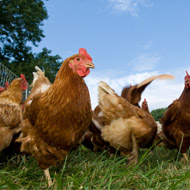Avian flu confirmed in new locations

A recent outbreak in a backyard flock in west Wales involved birds that had not been housed.
New cases of H5N8 avian influenza have been detected in wild birds across the UK and a wigeon in Ireland. Slovakia and the Czech Republic have also reported the disease for the first time.
A new strain in Europe, H5N5, has also been reported in Italy, the Netherlands and Montenegro. The origin and significance of this is not yet known, although Defra believes the discovery is likely to be down to increased surveillance for H5N8.
Defra’s latest disease update shows H5N8 has been confirmed in mute swans at a swannery in Dorset; in a wigeon, a greylag goose, a white fronted goose and a Canada goose in Gloucestershire; wigeons in Leicestershire and Lincolnshire; pochards, a mallard, a cormorant and a black headed gull in Merseyside; and a teal in Conwy, North Wales.
As these bird species are commonly found across Europe, Defra says the results are no surprise. Updates on wild birds testing positive for the virus will now be posted on the APHA website on a weekly basis.
Defra also reveals that a recent outbreak in a backyard flock in west Wales involved birds that had not been housed. Chickens had been allowed to mix freely with Muscovy ducks. The site is just 18km from a wild bird that tested positive in Llanelli, Carmarthenshire. A prevention zone currently in place requires all poultry and captive birds to be kept indoors or separated from wild birds.
Investigations have concluded that there is no link between this outbreak and a previous outbreak at a turkey farm in Lincolnshire.
New countries reporting the disease are Ireland (a single wild wigeon), Slovakia and Czech Republic.
Outbreaks continue to be reported in Croatia, France, Germany, Poland and Sweden. Defra expects the virus to remain an issue for a ‘considerable time’.



 The Veterinary Medicines Directorate (VMD) is inviting applications from veterinary students to attend a one-week extramural studies (EMS) placement in July 2026.
The Veterinary Medicines Directorate (VMD) is inviting applications from veterinary students to attend a one-week extramural studies (EMS) placement in July 2026.